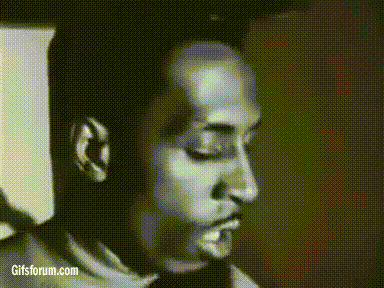I picked this version of River Deep Mountain High because it's the one where she truly nails it. I spent an incredible amount of time in the early '90s, when I was dealing with agonizing sexual abuse issues in therapy, listening and listening to this song. I did know something about the surreal Phil Spector "wall of sound", the densely-packed audio that seems to have no discernible crack in it, so that you had no choice but to be deeply immersed, if not drowned. Seeing Angela Bassett in What's Love Got to Do with it only intensified my exploration, my craving to understand this incredible, almost volcanic song, the way the sexual frenzy builds and builds until Tina screams the kind of scream you might scream if you saw your mother's ghost.
The lyrics are so turgid they're ready to explode:
Cause it grows stronger, like the river flows
And it gets bigger baby, heaven knows
And it gets sweeter baby, as it grows
It just gets bigger, yeah, and stronger and sweeter as it grows, until the primordial thunderblast that shatters the world. It's a rhapsodic description of something that is, after all, physiological, in and of the body (that place we all live in - remember?).
I just listened to some (not all, as it was 40 minutes or so) audio of the sessions that led to this incredible song. Mostly it's just the chopping away, take after laborious take, directions, corrections, slower, faster, louder, softer, that you'd hear in any recording session, but this one was done back in the day, when the only special effects were echo chambers that lent a surreal quality to the sound. The studio was small and the musicians extremely tight.
We hear certain individual components: the percussion and brasses forming the thudding primal underlay, then the strings, somehow blended together into one "thing", not even stringlike any more but like an organic, horsehair-and-wood synthesizer, and then the chorus folded together and eerily blended into a sheen of song. Spector liked to work his musicians until they were so exhausted they lost their individuality and had no choice but to became overwhelmed by that immense, reverberating wall. It's a kind of musical totalitarianism, but it worked.
It's interesting to listen to Tina, who seems to be saving herself in many of these takes, singing to keep the musicians on track. She never receives a word of direction: she's Tina Turner, for God's sake, and who needs to direct Hera or Venus or Cleopatra? In the final version, full-on passion leaps forward, and we hear an emotion that is almost agonizing, no doubt shot through with violence and despair as she tries to live and work beside her humiliating sadist of a husband.
When I listened to it late at night after not having heard it for, uh, I, uh - twenty years - damn if the song didn't go and change on me, as so many things do. It was still about sex, of course, and orgasm so powerful it catapults you into another dimension, even transcending love, but it's also about the weird, underwater, distorted, echoing world I was dragged into, the Wall of Sound. It hadn't been heard before and won't be again, because no one is as crazy as Phil Spector - I don't think I have ever seen a more demented human being in my life - and those times, primitive times in a technological sense, won't come again. Tina has long since retired, and though some say Beyonce is her successor, I don't believe there will ever be one.
Tina Turner was a force of nature, rippling, muscular, fleshy, intimidating, with a voice almost as extreme as Janis Joplin's, a howl of abandonment and grief. It takes courage and mesmerizing devotion to throw yourself into that canyon, and people usually do it only because they have no other choice if they are to avoid going completely insane.
I haven't described the eeriness of the Wall of Sound, because it's like listening to overtones, the strange whistling and fluting, sometimes theramin-like sounds that can pop out of an ordinary tone: they can't be there, but there they are, and we're swimming in it, it's rippling and echoing all around us. Dreamlike, even a little nightmarish. If you try to imagine the musicians clustered around and sweating and playing, you can't, because what they've played has been transformed and transfigured and rendered almost unrecognizable. They're just the source material for Something Else that can't even be easily defined.
Order The Glass Character from:
Thistledown Press
Amazon.com
Chapters/Indigo.ca






very cool explanation, coolest explanation yet.